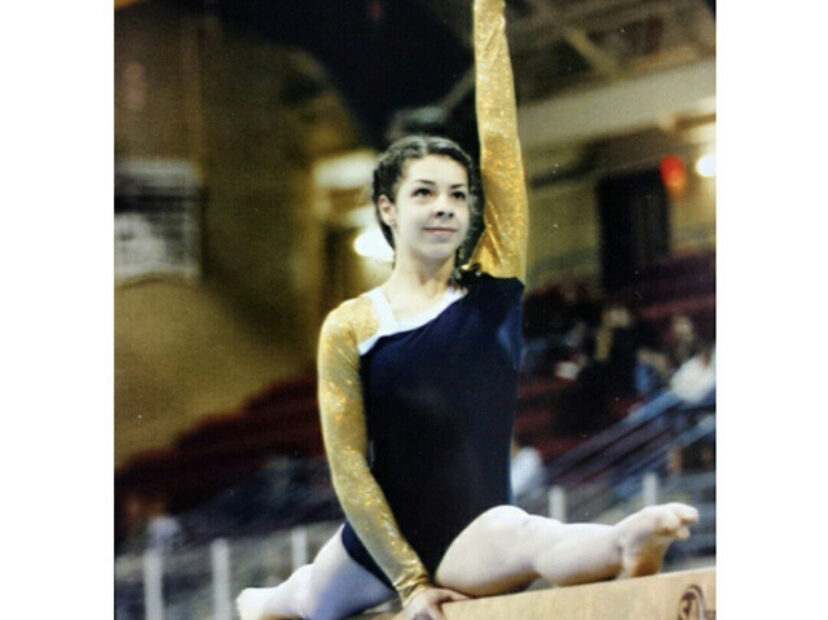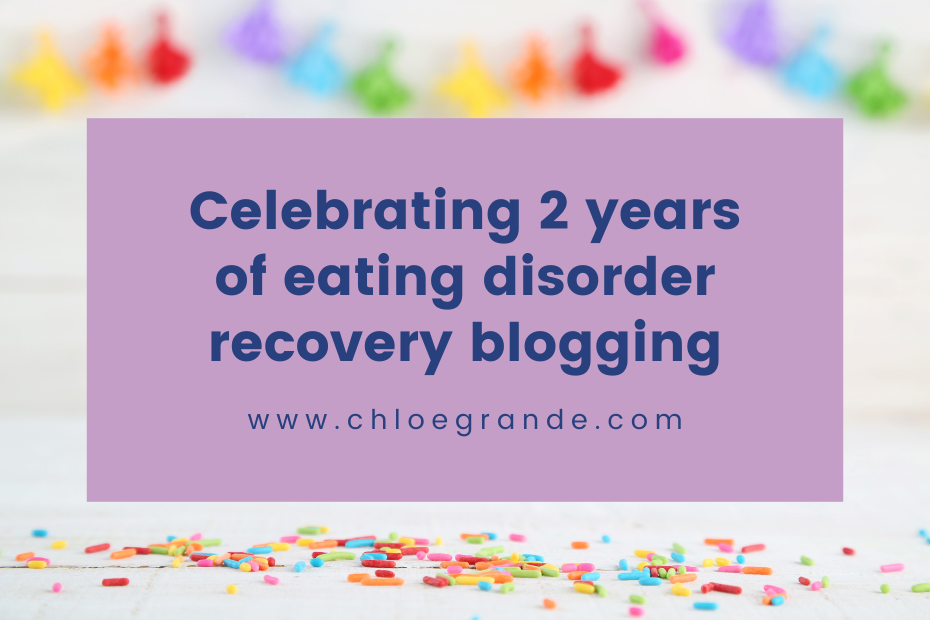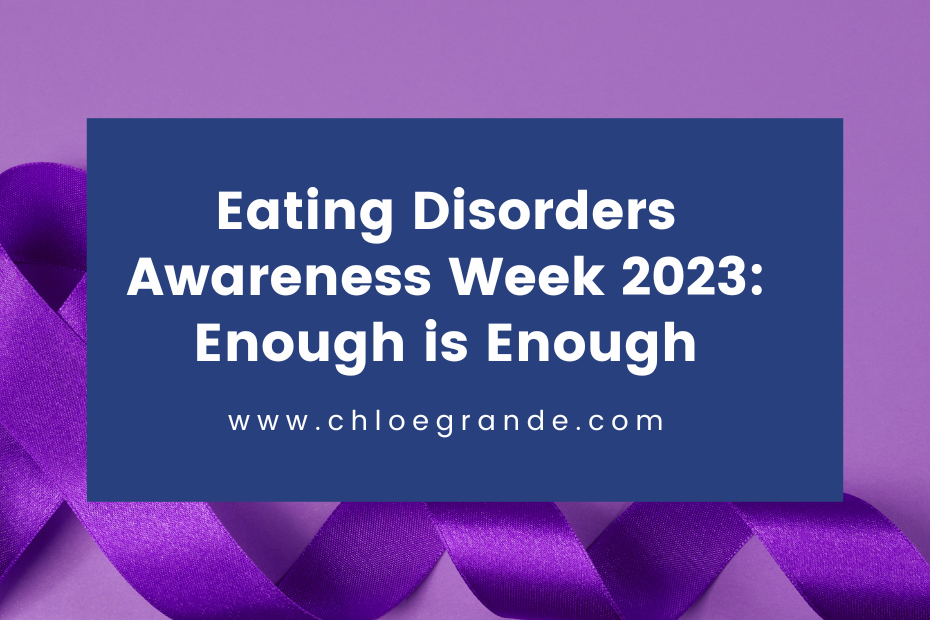There’s some truth behind the stereotype of gymnasts having eating disorders — sports that focus on appearance, weight requirements or muscularity are a risk factor for developing eating disorders.
That said, eating disorders are such complex mental illnesses that it’s nearly impossible to pinpoint one sole cause to the disease. In my case, gymnastics actually saved me from my eating disorder.
It should be called gym-nice-stics
Let me paint a picture of my high school gymnastics team. It was a friendly, fun-filled atmosphere. We trained 2-3 times a week, goofed around a lot, and took selfies on our Motorola Razr phones on the school bus to meets around Southern Ontario.
I truly believe in the power of sport to do great things. Research has shown that the benefits of children participating in organized sport range from improved self-esteem to better social skills and problem-solving. Plus, it’s fun.
Gymnastics was one of the things I was good at and thoroughly enjoyed. My teammates were (and some still are) my best friends.
Loving gymnastics but hating my body
My body image; however, was a different story. At the peak of my physical fitness ability, my body was my enemy. I hated it. Although I was strong and powerful, I believed that my muscles and lack of curves made me look “manly.”
During practice, I wore longer sleeves to cover my arm muscles. I was ashamed to draw attention to my athletic body and avoided “revealing” clothes as much as possible. I still remember one teammate referring to me as “muscle on a stick.” She meant it as a compliment.
Intervention from my coaches
It was my concerned coaches that first intervened when they noticed changes in me. My clothes fit looser, my energy seemed lower and my performance was certainly suffering during meets. I despised them at the time for thinking something was wrong with me.
Now, I can only thank them from the bottom of my heart and be grateful they had the courage to step in. Their intervention ultimately led to a referral to McMaster Children’s Hospital Eating Disorder Program.
I wish there had been a eureka moment at the beginning. Like, “Yes! I am so glad my coaches said something. I did wonder if something was the matter.” But unfortunately denial came first.
Your eating disorder voice tells you that you are never sick enough. That they are jealous of you! They wish they had your discipline. And by discipline, I mean a complete and utter loss of enjoyment with life’s everyday activities.
Advice to my younger gymnast self
Since I competed in gymnastics well over 10 years ago, the sport has faced a reckoning. Films like Athlete A shone a light on the darker side of the sport, one filled with sexual assault and abuse of power. And we’re seeing greater levels of representation, like Nia Dennis’ epic floor routine celebrating Black excellence.
My advice to gymnasts today (and really to any young person participating in sports linked to higher risk of eating disorders — like dance, swimming, wrestling, running or figure skating) is as follows:
- Don’t take yourself too seriously. Yes, competition and awards matter, but so do the friendships you form with teammates and the actual enjoyment you get from the sport.
- If things feel off, like you aren’t enjoying the sport as much as you used to or you’re beginning to obsess over what food goes into your body, pull aside a coach and ask their advice.
- Try to focus more on what you like, rather than what you want to change, about your body. One day you will look back in awe at all the amazing things your body achieved.
To my coaches and fellow gymnasts that supported and rooted for me, thank you. I will always remember the compassion that was shown when I was side-lined after my eating disorder diagnosis.
I’m curious if other athletes have experienced pressure to look a certain way. Let me know in the comments below.





Thank you for your message, and wise advice, Chloe. It takes so much bravery to offer this kind of self-disclosure, and I feel sure that you will help others to gain the courage to seek help, and speak their truth.
Mari, you are so kind. I really appreciate your support and hope that is the case that others will also seek help! Thank you!
I’m a friend of your mom’s. Congratulations on your healing journey. It takes courage. I was a professional modern dancer so I know how much eating disorders can affect many in the dance profession. Gymnastics is a sister profession with exacting physical demands. You already possess the mental, emotional and physical attributes of strength and fortitude and agility (learned in gymnastics) in your healing journey, only not expressed as their “destructive/shadow” side. You are beautiful and strong. I look forward to reading more of your blog.
Thank you very much, Zella. I so appreciate you taking the time to read and comment! As a dancer, I’m sure you felt similar pressure on your appearance and I can imagine it takes a lot of inner strength to push through that. I like how you refer to the “shadow” side, that’s such an accurate way of describing perfectionism disguised as an ED. Fortunately our sports taught us a lot about mental strength! Thanks again for the kind words, it means a lot to reach others who have experienced something similar to me.
Interesting post Chloë! I never experienced any comments on my appearance when I was practicing yoga with a group. And it was (overall) a healing experience, because I felt a sense of community, and there was a vibe of body-positivity and inclusiveness.
However, there was something more subtle going on at certain studios, where we were required to show up on the mat and practice no matter what, 6 days a week, no matter what we were feeling. This somehow eventually led me to distrust my body. The attitude there was, your body can trick you into being lazy, so don’t listen to it. And pain isn’t necessarily an indicator to stop, it’s a sign that you need to push through something in order to heal, and work harder. So – eventually after a couple of injuries, I stopped practicing that type of yoga. When there’s a sense of forced discipline, no matter how body-positive the environment is, it can in my experience lead to this sense of distrusting how I actually feel in that moment. Which led to injury.
Now I am all about listening to the body, taking it easy, just doing what’s healthy. Any environment that encourages this type of balance – doing the work, but not being over-disciplined – is probably healthy, but it’s a fine balance!
Thank you for the insight, Stephanie! Such an interesting observance. I too have had mostly positive experiences with yoga. But you’re completely right that a sense of forced discipline is a red flag. It sounds like the type of yoga and movement you’re doing now is much more positive experience. Your experience shows that even a sport like yoga, where you don’t expect there to be competition, can create a negative relationship with your body. I’m so glad to hear you are in a better place now!